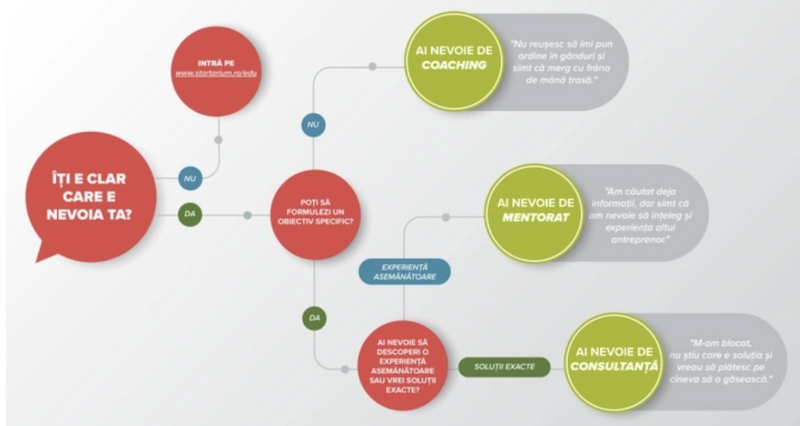When difficult decisions or dilemmas arise, entrepreneurs and managers can turn to 3 types of support: mentoring, consulting or coaching. Since there are similarities between them, you should identify the right solution for your situation. Find out how to identify it!

You have probably heard a lot of talk about the "entrepreneurial spirit" and about the ability of entrepreneurs to turn barriers into opportunities and the resilience to turn their business ideas into reality. Those who succeed and do not abandon their dream often have various allies, who are life or business consultants, mentors or coaches.
In order to find the right choice for you, in this article we present three tools that you can use. Whether you choose one or all of them, here's what sets them apart and what benefits you can get from each.
 What does consulting mean?
What does consulting mean?
Consulting involves help offered to a start-up or an organization in relation to a specific business issue. Such issues may include: business development, better management of finances, improvement of customer relations or needs regarding fiscal (taxes, duties, social contributions) or legal (intellectual property rights, personal data protection) issues.
A consultant can help you by:
• Diagnosing your issue regarding the aspect you want to solve.
• Giving you an objective and independent perspective
• Evaluating potential solutions and presenting recommendations.
• Implementing the proposed solutions and training the employees/entrepreneur.
• Sharing their knowledge and experience and providing a new and valuable perspective.
What does coaching mean?
The International Coaching Federation defines it as a partnership between a coach and a customer, achieved through a challenging and creative process that inspires the latter to maximize their personal and professional potential. Practically, through a dialogue, the coach asks a person questions meant to expand their way of thinking on a certain issue. Thus, the coachee optimizes certain aspects of their personal or professional life through their own solutions, not solutions offered by a third party.
A coach can help you by:
• Action-orienting you and guiding you towards the result you want to achieve.
• Facilitating the dialogue objectively so that you can reach the answers yourself.
• Contributing to the development of the soft skills necessary in entrepreneurship (communication, leadership, adaptability, social intelligence).
• Supporting you to act according to your true motivations and thus be more inspired to continue.
• Supporting you to look beyond prejudices and come up with new solutions to old personal/professional problems.
What does mentoring mean?
Mentoring is a professional relationship where a more experienced person (the mentor) supports and encourages another person (the mentee) to develop specific skills and knowledge that will maximize their business potential and improve their performance. In other words, it is a transfer of knowledge, skills and experience, and the mentor guides you to find the right direction and identify solutions for the proposed objective.
A mentor can help you by:
• Guiding you and helping you build an action plan to stick to, starting from your own goals, which you must set for yourself
• Giving you personalized feedback and practical suggestions from their own experience.
• Inspiring and motivating you by sharing their own experiences.
• Challenging you personally and professionally so that both you and your business can develop.
• Giving you various useful resources on your entrepreneurial journey.
So, what should you choose: a consultant, a mentor or a coach?
The answer is: all three. During the entrepreneurship journey, you will face various challenges and obstacles which can be overcome more easily with external help, not to mention that this help can also help you achieve performance faster.
But in order to know what you need right now, think about the following scenarios:
1. Is your startup facing a specific problem? It may be a short-term strategic, financial or legal need. Then a consultant who could share their expertise and offer you the right solutions would be more suitable.
2. Do you have a business idea or are you preparing to launch/relaunch your startup? Then you might benefit from the outside perspective of a mentor to help you with suggestions from their personal experience and from support during this learning period.
3. If you feel that your personal potential is not being used to its full potential and this is affecting your success as an entrepreneur, then you may need a coach. This will help you capitalize on your strengths and become more self-confident.
Regardless of the situation you may find yourself in of the 3, the most important thing is to clarify your need and set a goal so that the help of the consultant, mentor or coach can be really relevant. In order for the investment to pay off, it's important for you to be 100% involved in the process and make a total commitment, and the results will not take long to appear.
#FINDYOURSELFSOMEALLIES
Find mentors, coaches and consultants in Startarium
People and organizations to connect with as an entrepreneur
How mentoring works in Startarium:
You can choose from over 50 entrepreneurs and specialists whom you can work with for free. Find out more about mentoring during this course and learn what a Startarium mentoring relationship looks like from Alex and Elena, mentor and mentee of our community.
The duration of a coaching, mentoring or consulting process depends, of course, on the needs of every individual and on the relationship between the parties. In consulting, a contract ends when the problem for which the consultant was called has been solved. The mentoring or coaching period takes, on average, between 3 to 6 months, a longer duration presenting the risk of creating a relationship of dependency between the two parties. The purpose of a mentor/coach is to help you until you reach your goal and you are autonomous enough to continue on your own.











